Movie City Indie Archive for April, 2010
Looking back, looking forward: HotDocs 2009-2010
My first mistake was traveling with a fractured rib. I’d planned to cover films and panels in great detail at HotDocs 2009, but when every sneeze, cough or laugh is accompanied by a sharp rebuke from deep inside, it becomes daunting. For two days before my flight, I’d been in the hospital for all kinds of tests, all of which came up clean. I was determined not to cancel my trip to HotDocs. The prognosis was a relief, especially considering that only about six weeks earlier, I’d been at another documentary festival, the Thessaloniki International, where walking past a political rally held by a right-wing party led to trouble. Taken for “an anarchist infiltrator,” I got a beating in the Square of Heavenly Wisdom that could have been deadly, if not for the intercession of a couple of concerned riot police.
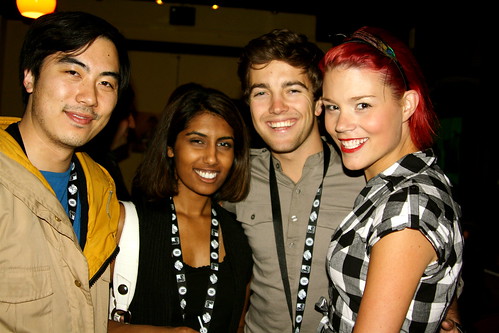
(I wrote about that incident here.) Still, I thought I’d be fine, I’d be blogger-on-the-spot, with reviews and stills and videos on a tick-tock timely basis, a tough enough prospect, as every online writer soon discovers, even without stabbing pain. (I was grateful for the strangers I met who had read my Thessaloniki story and for their kind empathy, even if most wrongly assumed that the rib and the Greek incident were related.) I’ll be attending the last four days of HotDocs 2010; my fingers are crossed. Reporting on the opening weekend’s panels and activities makes me envious. I’m hoping it’ll still be valuable to observe the waning days rather than the friendly frenzy of meeting and greeting that makes HotDocs such an important festival for documentary makers and programmers to attend.
What perspective does a year offer, rather than the hot-hot-heat of insta-posting? Checking into my hotel the first rainy afternoon, James Toback was just down the hall, the door ajar, and he was loudly, proudly regaling the bellman with Michael Tyson stories. I thought better of a hello. In the evening, there was a Brit party in Kensington, where my friend from Sheffield’s DocFest, Hussain Currimbhoy ran interference while I held my rib. A bracing bit of perspective was immediately at hand when Yung Chang [left]introduced Nimisha Mukerji and Philip Lyall, the filmmakers of 65redroses, and their subject, Eva Markvoort ([right]. Eva had been a lifetime sufferer of cystic fibrosis, and the fierce documentary is a heartbreaker. More perspective: Eva passed away less than a month ago, at the age of 25.

Autumn’s Toronto International is abandoning its Yorkville origins, moving further south in the city, including at their new headquarters. Even with the first months of economic trouble, the sky in the area around most of the HotDocs programming was shadowed with construction cranes.

Still: spring. Spring in Toronto, a lovely time.
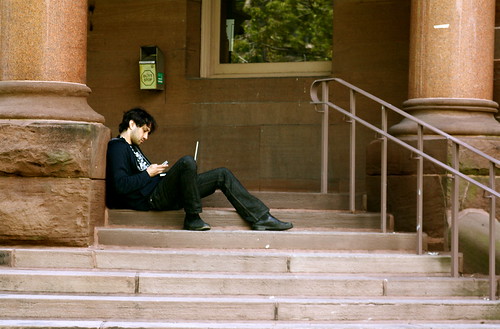
The Rogers Industry Centre is located in a building on the Victoria College campus, and collegiate (collegial?) informality rules. Mila Aung-Thwin, from Eyesteel Film, catches sun and WiFi.
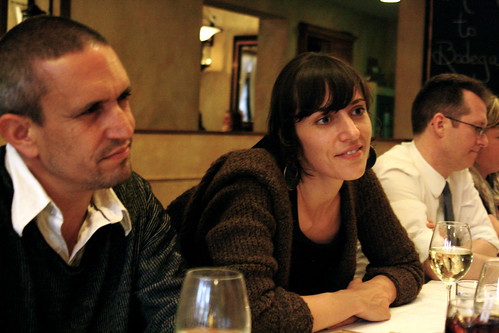
Conversations are rich, even if you were to only eavesdrop on the likes of Andy Bichelbaum (The Yes Men Fix The World), Astra Taylor (The Examined Life) and Thom Powers, TIFF documentary programmer and creator and host of the Stranger Than Fiction documentary series in New York.
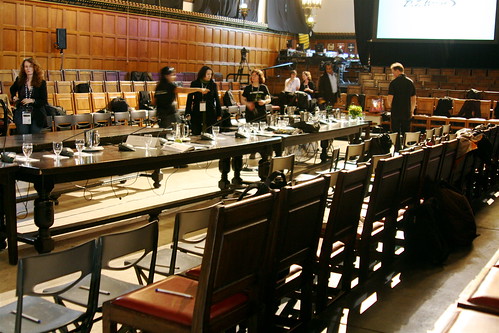
For two days, filmmakers pitch at the Toronto Documentary Forum, with fifteen minutes to convince the commissioning editors around this table that their work deserves their channel’s cash. Eugene Jarecki is one of the most impressive pitch artists I’ve ever witnessed. A highlight in 2009 was a slightly nervous Christopher Hitchens talking up a film about his lecture tour casting doubts on God.

The late nights are sometimes comfortingly inexplicable.
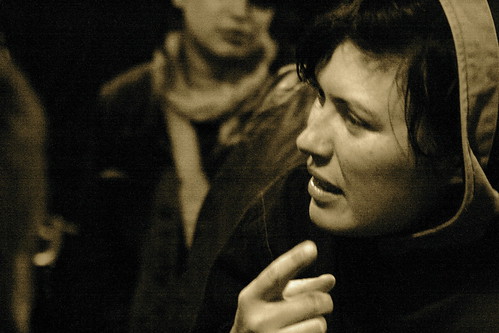
And language barriers are no barrier over drinks.
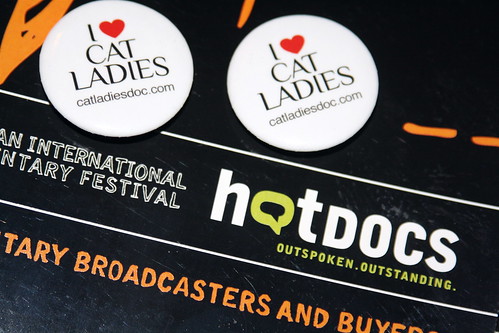
Logistical mayhem is eased by the Doc Shop, where films in the festival, as well as films that were submitted did not make the cut, are available to view on an extremely well-designed system, feeding from a closed server onto rooms full of stations lit by iMac screens. Postcards and buttons are sometimes clever enough to convince you a film like Cat Ladies is worth a peek.
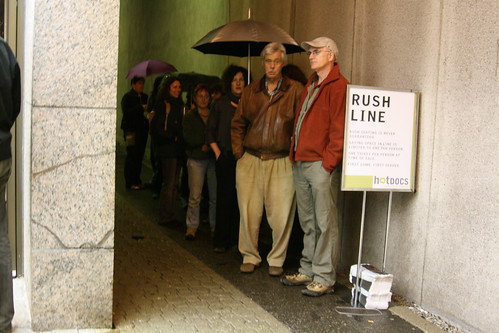
Meanwhile, rain. Rush lines. Eager filmgoers. Terrific films, serious-minded and giddy alike. Thursday’s opening night film was Babies, or, “March Of The Zygotes.” And the cycle begins for HotDocs 2010… [An extended slideshow of forty-seven HotDocs 2009 photos is here; my 2008 photos-and-text report for Variety is here.]
HotDocs 2009: Talking optimism with Yung Chang, Eva Weber and Sarah Goodman
Documentary filmmakers are the most determined, yet optimistic artists I know. There are grumps and divas, but still… Last March, at Hot Docs 2009, I asked three filmmakers I admire to cheer me up with their optimism: Yung Chang (Up the Yangtze, Eva Weber (The Solitary Life of Cranes, Steel Homes) and Sarah Goodman (Army of One, When We Were Boys). I hope to capture some of the same spirit later this week in Toronto.
Bill Murray reads poetry to construction workers
At the building site for Poet’s House in Manhattan. Selections include Emily Dickinson.
U. S. filmmakers call for release of Jafar Panahi, director jailed by his gov't
AMERICA’S LEADING FILMMAKERS CALL FOR RELEASE OF IMPRISONED IRANIAN DIRECTOR JAFAR PANAHI
Steven Spielberg, Martin Scorsese, Robert Redford, Francis Ford Coppola, Terrence Malick, Steven Soderbergh, the Coen brothers, Jim Jarmusch, Michael Moore, Ang Lee, Robert De Niro and Oliver Stone, among other leading film industry figures, have condemned the detention of Jafar Panahi, the acclaimed director and are  urging the Iranian government to release him. Panahi, director of award-winning films such as he White Balloon, The Circle, Crimson Gold and Offside, was arrested at his home March 1a nd has been held since in Tehran’s notorious Evin prison. A number of filmmaking luminaries have come to Mr. Panahi’s defense and “condemn his detention and strongly urge the Iranian government to release Mr. Panahi immediately,” according to a new petition. Islamic Republic officials initially charged Mr. Panahi with “unspecified crimes.” They have since reversed themselves, and the charges now allege that he was making a film against the regime, a very serious accusation in Iran.
urging the Iranian government to release him. Panahi, director of award-winning films such as he White Balloon, The Circle, Crimson Gold and Offside, was arrested at his home March 1a nd has been held since in Tehran’s notorious Evin prison. A number of filmmaking luminaries have come to Mr. Panahi’s defense and “condemn his detention and strongly urge the Iranian government to release Mr. Panahi immediately,” according to a new petition. Islamic Republic officials initially charged Mr. Panahi with “unspecified crimes.” They have since reversed themselves, and the charges now allege that he was making a film against the regime, a very serious accusation in Iran.
Mr. Panahi’s films have been banned from screening in Iran for the past ten years and he has been kept from working for the past four years, but he continues to stay in Iran. “Mr. Panahi deeply loves his country,” says Jamsheed Akrami, an Iranian-American film scholar and filmmaker, who helped organize the petition. “Even though he knows he could have opportunities to work freely outside of his homeland, he has repeatedly refused to leave. He would never do anything against the national interests of his country and his people.” Panahi won the Silver Bear at the Berlin International Film Festival for Offside (2006), the Un Certain Regard Prize at the Cannes Film Festival for Crimson Gold (2003), the Golden Lion at the Venice Film Festival for The Circle (2000), the Golden Leopard at the Locarno International Film Festival for The Mirror (1997) and the Cannes Camera d’Or for The White Balloon (1995).
PETITION: Free Jafar Panahi
Jafar Panahi, the internationally acclaimed Iranian director of such award-winning films as The White Balloon, The Circle, Crimson Gold and Offside, was arrested at his home on March 1st in a raid by plain-clothed security forces. He has been held since then in Tehran’s notorious Evin prison. A recent letter from Mr. Panahi’s wife expressed her deep concerns about her husband’s heart condition, and about his having been moved to a smaller cell. Mr. Panahi’s films have been banned from screening in Iran for the past ten years and he has effectively been kept from working for the past four years. Last October, his passport was confiscated and he was banned from leaving the country. Upon his arrest, Islamic Republic officials initially charged Mr. Panahi with “unspecified crimes.” They have since reversed themselves, and the charges are now specifically related to his work as a filmmaker.
We (the undersigned) stand in solidarity with a fellow filmmaker, condemn this detention, and strongly urge the Iranian government to release Mr. Panahi immediately. Iran’s contributions to international cinema have been rightfully heralded, and encouraged those of us outside the country to respect and cherish its people and their stories. Like artists everywhere, Iran’s filmmakers should be celebrated, not censored, repressed, and imprisoned.
Signed:
Paul Thomas Anderson
Joel & Ethan Coen
Francis Ford Coppola
Jonathan Demme
Robert De Niro
Curtis Hanson
Jim Jarmusch
Ang Lee
Richard Linklater
Terrence Malick
Michael Moore
Robert Redford
Martin Scorsese
James Schamus
Paul Schrader
Steven Soderbergh
Steven Spielberg
Oliver Stone
Frederick Wiseman
Petition Organizing Committee: Jamsheed Akrami, Godfrey Cheshire, Jem Cohen, Kent Jones, Anthony Kaufman
The House That Jack Built by Ron Tunis (1967)
8 minutes of National Film Board goodness.
Walter Murch on "Three Fathers of Cinema"
Walter Murch: “Three Fathers of Cinema” from Argentina’s Old School Cinema on Vimeo.
Mr. Murch: always a must.
P. R. Fluff'n'stuff: Couric on Pacino
It may mostly be familiar “hoo-ha!” from Pacino, but he’s always a pleasure to watch, even in footage that’s been edited to a fine puree. Cheers to 70 years, Mr. P.
Getting Started, Richard Condie (1979)
From the NFB, a 12-minute ode to procrastination.
Assayas talks Carlos

In what’s described as an exclusive, Olivier Assayas talks to JM Frodon about his Cannes-bound five-and-a-half-hour Carlos at the French edition of Slate (Google translation). A quick tidying of one of the passages: “I knew I had the opportunity to do something unlikely, at least in France: a film this long, with great characters, situations and settings, without stars, with actors who are really the nationality of their characters, speaking in their own language. That’s the kind of freedom that only the [most powerful] in Hollywood can get when they are in a position to impose their conditions onto the studios. In France, it is impossible. Today, it makes me laugh that there are some among French cinema professionals, who tried to stop the film at Cannes, saying that is television and not cinema. I want to tell them: indeed it is not the kind of formatted, controlled film that you do. It is a form of cinema that you forbid me to do, and which is infinitely more cinematic than three-quarters of the shit you produce. For me, movies are made to be shown on the big screen. The paradox is that while this movie would never have been funded by the cinema as it operates in France, on television, although this is not the place of dramatic and aesthetic freedom, this is an opportunity offering me rare freedom.” [Link originale.]
Lynne Ramsay's back
After an unfortunate detour with a lost version of The Lovely Bones, the director of Gasman, Ratcatcher and Morvern Callar is back, shooting her new film, We Need To Talk About Kevin. This video for the Doves’ “Black and White Town” is one of the few visible bits of her work in the past decade. Why is she missed? [A scene from Ratcatcher, below.]
Hitler orders DMCA hits on Downfall parodies
Hitler, as “Downfall producer” orders a DMCA takedown from Brad Templeton .
By the former chairman of the Electronic Frontier Foundation. Detailing his purpose.











